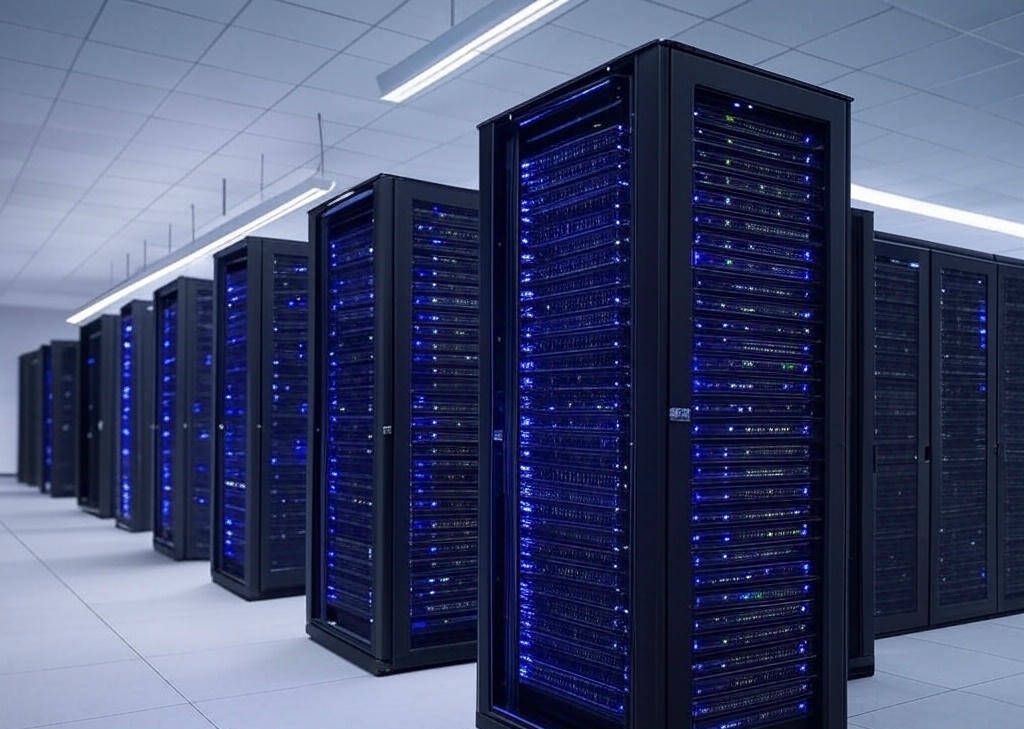One of the most critical decisions organizations face when planning their AI and high-performance computing strategy is choosing between colocation and cloud computing. Both approaches offer distinct advantages, and selecting the right option depends on your specific workload characteristics, budget constraints, and long-term objectives.
At IDACORE, we offer both premium colocation services and Idaho-based cloud solutions, providing our clients with flexible options to meet their evolving needs. In this article, we'll explore the key factors to consider when making this important decision, with a specific focus on AI workload requirements.
Understanding the Fundamentals: Colocation vs. Cloud
Before diving into specific considerations for AI workloads, let's clarify the fundamental differences between colocation and cloud computing:
Colocation: Your Hardware, Our Facility
With colocation, you own and maintain your hardware while renting space in our data center facility. IDACORE provides the physical space, power, cooling, and network connectivity, while you maintain complete control over your infrastructure.
Key characteristics of colocation include:
- Full control over hardware selection and configuration
- Predictable monthly costs
- Direct physical access to your equipment
- Capital expenditure model for hardware
- Responsibility for hardware maintenance and upgrades
Cloud Computing: On-Demand Resources
Cloud computing provides virtualized computing resources available on-demand. With our Idaho cloud solutions, you access compute, storage, and networking resources as a service, without managing the underlying physical infrastructure.
Key characteristics of cloud computing include:
- Rapid deployment and scalability
- Pay-as-you-go or subscription pricing models
- No hardware ownership or maintenance
- Operating expenditure model
- Access to managed services and platforms
"The choice between colocation and cloud isn't an either/or decision. Many organizations benefit from a hybrid approach, leveraging the strengths of each model for different aspects of their infrastructure."
Evaluating AI Workload Requirements
Artificial intelligence workloads have unique characteristics that can significantly influence the colocation versus cloud decision. Let's examine the key factors to consider:
1. Performance Requirements
AI workloads, particularly deep learning training, often demand extraordinary computational performance and specialized hardware like GPUs or other accelerators.
| Colocation Advantages | Cloud Advantages |
|---|---|
|
|
Verdict for Performance: For organizations with well-understood, stable AI workloads that require maximum performance, colocation often provides advantages. For experimental or variable workloads, cloud flexibility may be more valuable.
2. Cost Structure and Predictability
AI infrastructure costs can be substantial, making cost optimization a critical consideration.
| Colocation Advantages | Cloud Advantages |
|---|---|
|
|

Verdict for Cost Structure: For steady-state, high-utilization AI workloads that run consistently, colocation typically provides better long-term economics. For variable workloads with inconsistent usage patterns, cloud computing often proves more cost-effective.
3. Scalability and Flexibility
AI projects often evolve rapidly, with changing resource requirements as models are developed, trained, and deployed.
| Colocation Advantages | Cloud Advantages |
|---|---|
|
|
Verdict for Scalability: Cloud computing excels at rapid, dynamic scaling, making it ideal for experimental AI workloads and projects with unpredictable growth. Colocation provides more controlled, planned scaling for established AI systems with predictable growth patterns.
4. Data Gravity and Transfer Considerations
AI workloads often involve massive datasets, making data storage, transfer, and accessibility critical considerations.
| Colocation Advantages | Cloud Advantages |
|---|---|
|
|
Verdict for Data Considerations: Organizations with large, relatively static datasets often benefit from colocation to avoid data egress charges and maintain consistent I/O performance. Cloud solutions excel when data needs to be globally accessible or when leveraging specialized cloud data services.
Real-World Decision Frameworks
Beyond these general considerations, specific AI workload patterns often align better with either colocation or cloud approaches:
AI Workloads That Typically Favor Colocation
- Large-Scale Model Training: Organizations training massive AI models with consistent, high-utilization workloads often see better economics and performance with colocation. The predictable resource usage and need for specialized hardware configurations make colocation particularly suitable.
- HPC and Research Computing: Research institutions and labs running complex simulations and analysis benefit from the bare-metal performance and customization options of colocation.
- Workloads with Steady-State Usage: AI systems that operate continuously with predictable resource needs typically achieve better TCO with colocation.
- Compliance-Sensitive Applications: Organizations with strict regulatory requirements often prefer colocation for the complete control over the physical infrastructure.
AI Workloads That Typically Favor Cloud
- Development and Testing: AI development environments benefit from the ability to quickly provision and deprovision resources as needed during the development cycle.
- Bursty Inference Workloads: AI applications with variable usage patterns, such as recommendation engines with peak usage times, can leverage cloud scaling to match resource provisioning with demand.
- Early-Stage AI Projects: Organizations in the early stages of AI adoption often benefit from cloud's low barrier to entry and flexibility.
- Globally Distributed Inference: AI systems that need to serve users across multiple geographic regions can leverage cloud providers' global infrastructure.
The IDACORE Hybrid Advantage
At IDACORE, we recognize that many organizations benefit from a hybrid approach that combines elements of both colocation and cloud. Our Idaho data center facility is uniquely positioned to support hybrid deployments with several key advantages:
Colocation with Cloud Adjacency
Organizations can deploy high-performance AI training infrastructure in colocation environments while maintaining low-latency connections to cloud resources for burst capacity or specialized services.
Cloud On-Ramp Services
Our direct connectivity to major cloud providers enables hybrid architectures that leverage both private infrastructure and public cloud resources with minimal latency and maximum security.
Unified Management
IDACORE's management portal provides a consistent view of both colocation and cloud resources, simplifying hybrid infrastructure management.
Migration Pathways
We offer services to facilitate movement between colocation and cloud environments as your needs evolve, providing flexibility without lock-in.
Case Study: Hybrid AI Infrastructure
A healthcare analytics company utilizing AI for medical imaging analysis deployed a hybrid infrastructure at IDACORE with the following components:
- Colocation Component: High-performance GPU clusters for training complex imaging models, with dedicated high-speed storage arrays for their multi-petabyte imaging dataset.
- Cloud Component: Scalable cloud resources for inference serving, allowing the system to handle variable query loads from healthcare providers across multiple time zones.
This hybrid approach allowed them to:
- Optimize costs by placing steady-state workloads in colocation
- Maintain complete control over sensitive patient data
- Scale inference capacity dynamically to match demand
- Reduce time-to-market for new AI capabilities
Decision Framework: A Practical Guide
To help determine which approach best suits your specific AI workload, consider the following decision framework:
- Assess Workload Stability: Determine how predictable your resource needs are. Stable, consistent workloads typically favor colocation, while variable workloads favor cloud.
- Analyze Utilization Patterns: Calculate your expected resource utilization. High-utilization workloads (>60%) usually achieve better economics with colocation.
- Evaluate Capital Position: Consider your organization's preference for capital expenditure versus operational expenditure models.
- Audit Control Requirements: Assess how much control you need over the infrastructure stack, from hardware to software.
- Calculate Data Gravity: Consider where your data currently resides and the costs of moving it.
- Project Growth Trajectory: Estimate how your AI infrastructure needs will evolve over the next 3-5 years.
Based on these factors, you can identify whether colocation, cloud, or a hybrid approach best aligns with your requirements.
Conclusion: Making the Right Choice for Your AI Workloads
The choice between colocation and cloud for AI workloads isn't a simple binary decision. Each approach offers distinct advantages, and many organizations find that a thoughtfully designed hybrid strategy delivers the best results.
At IDACORE, we leverage our Idaho data center's unique advantages—affordable power, excellent connectivity, and natural cooling efficiency—to deliver exceptional value for both colocation and cloud services. Our team works closely with clients to analyze their specific requirements and develop infrastructure strategies that optimize performance, cost, and flexibility.
Whether you choose colocation, cloud, or a hybrid approach, IDACORE's Idaho facility provides the foundation you need to power your AI innovation sustainably and cost-effectively.
Get Expert Infrastructure Guidance
Ready to explore whether colocation, cloud, or a hybrid approach is right for your AI workloads? Contact IDACORE's solutions architects for a personalized consultation and infrastructure assessment.
Schedule a Consultation

